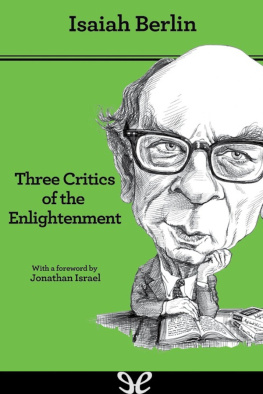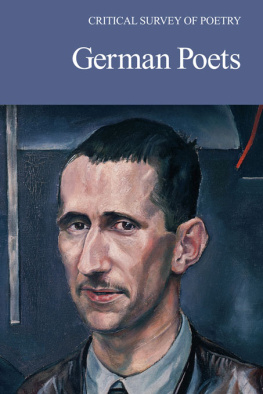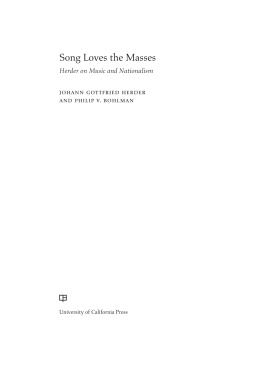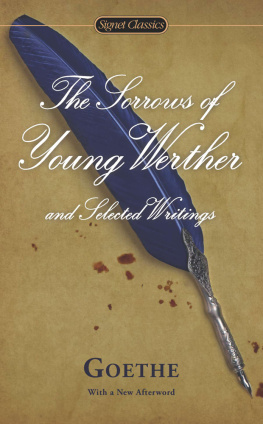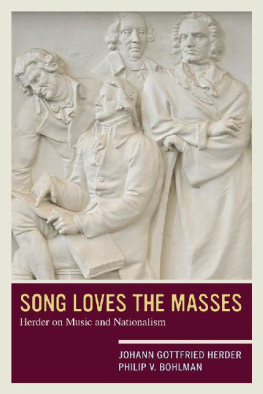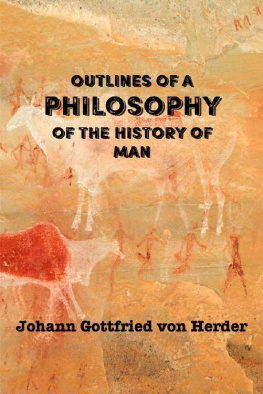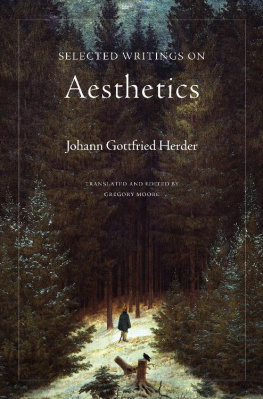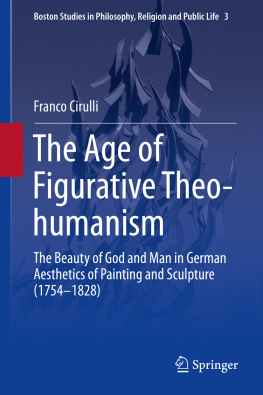Herder Johann Gottfried von - Selected Writings on Aesthetics
Here you can read online Herder Johann Gottfried von - Selected Writings on Aesthetics full text of the book (entire story) in english for free. Download pdf and epub, get meaning, cover and reviews about this ebook. year: 2008, publisher: Princeton University Press, genre: Science. Description of the work, (preface) as well as reviews are available. Best literature library LitArk.com created for fans of good reading and offers a wide selection of genres:
Romance novel
Science fiction
Adventure
Detective
Science
History
Home and family
Prose
Art
Politics
Computer
Non-fiction
Religion
Business
Children
Humor
Choose a favorite category and find really read worthwhile books. Enjoy immersion in the world of imagination, feel the emotions of the characters or learn something new for yourself, make an fascinating discovery.
- Book:Selected Writings on Aesthetics
- Author:
- Publisher:Princeton University Press
- Genre:
- Year:2008
- Rating:3 / 5
- Favourites:Add to favourites
- Your mark:
- 60
- 1
- 2
- 3
- 4
- 5
Selected Writings on Aesthetics: summary, description and annotation
We offer to read an annotation, description, summary or preface (depends on what the author of the book "Selected Writings on Aesthetics" wrote himself). If you haven't found the necessary information about the book — write in the comments, we will try to find it.
Selected Writings on Aesthetics — read online for free the complete book (whole text) full work
Below is the text of the book, divided by pages. System saving the place of the last page read, allows you to conveniently read the book "Selected Writings on Aesthetics" online for free, without having to search again every time where you left off. Put a bookmark, and you can go to the page where you finished reading at any time.
Font size:
Interval:
Bookmark:
Selected Writings on Aesthetics
Selected Writings on Aesthetics
Johann Gottfried Herder
TRANSLATED AND EDITED BY GREGORY MOORE
PRINCETON UNIVERSITY PRESS
PRINCETON AND OXFORD
Copyright 2006 by Princeton University Press
Published by Princeton University Press, 41 William Street, Princeton,
New Jersey 08540
In the United Kingdom: Princeton University Press, 3 Market Place,
Woodstock, Oxfordshire OX20 1SY
LIBRARY OF CONGRESS CATALOGING-IN-PUBLICATION DATA
Herder, Johann Gottfried, 17441803.
[Selections. English. 2006]
Selected writings on aesthetics / Johann Gottfried Herder ; translated and edited by Gregory Moore.
p.cm.
Includes bibliographical references and index.
eISBN: 978-1-40082-716-9
1. Aesthetics. I. Moore, Gregory, 1972 . II. Title.
BH39.H456213 2006
111'.85dc222005029475
All Rights Reserved
British Library Cataloging-in-Publication Data is available
This book has been composed in Sabon
Printed on acid-free paper.
pup.princeton.edu Printed in the United States of America
10 9 8 7 6 5 4 3 2 1
CONTENTS
ACKNOWLEDGMENTS
I thank Barry Nisbet for suggesting me for this project and for his willing and valuable advice throughout; Ian Malcolm at Princeton University Press for his help and patience; Martyn Powell, who commented on an early draft of the introduction; and Dalia Geffen for preparing and improving the manuscript. Most of all I am grateful to Bettina Bildhauer, not only for her encouragement and assistance in rendering some of Herders occasional stylistic obscurities but for much else besides: Im sorry.
NOTE ON THE TEXTS
BECAUSE HERDER WROTE widely on aestheticsand on art and literature more generallyno single volume can pretend to be a comprehensive collection of his work in this area. At most this collection aims to introduce the English-speaking reader to what are, by common scholarly consensus, some of Herders most important relevant writings, as well as several lesser known but no less interesting texts, and to cover as wide a range of themes as possible. Perhaps the most significant omissions here are the Fragmente and Plastik (both are already available in translation) and Kalligone (Herders interesting, misguided, and unfortunately very long polemic directed against Kants Critique of Judgment).
The texts are based on two German editions: Smtliche Werke, edited by Bernhard Suphan (Berlin: Weidmann, 18771913), and Werke, edited by Gnter Arnold et al. (Frankfurt am Main: Deutscher Klassiker Verlag, 19852000). In compiling my explanatory notes, I drew from the commentaries included in these editions, as well as in two other editions of Herders writings: Werke, edited by Wolfgang Pross, vol. 2 (Munich: Hanser, 1987), and Kritische Wlder, edited by Regine Otto, 2 vols. (Berlin and Weimar: Aufbau-Verlag, 1990).
With the exception of the essay Shakespeare, all texts included in this volume are translated into English for the first time. Several other translations of Herders writings contain works that bear directly or indirectly on the theme of aesthetics: Selected Early Works, 17641767, translated by Ernest A. Menze, with Michael Palma (University Park: Pennsylvania State University Press, 1992), includes Fragmente ber die neuere deutsche Literatur and several shorter writings; the long essay Plastik has been translated by Jason Geiger as Sculpture (Chicago, IL: University of Chicago Press, 2002); Michael N. Forsters collection Philosophical Writings (Cambridge: Cambridge University Press, 2002) includes a fragment on taste and Essay on the Origin of Language; F. M. Barnards J. G. Herder onSocial and Political Culture (Cambridge: Cambridge University Press, 1969) contains partial translations of Journal of My Journey in the Year1769; there is also the rather antiquated translation by James Marsh of The Spirit of Hebrew Poetry (Burlington, VT: Edward Smith, 1833).
H. B. Nisbets German Aesthetic and Literary Criticism: Winckelmann,Lessing, Hamann, Herder, Schiller, Goethe (Cambridge: Cambridge University Press, 1985) includes not only Herders Correspondence on Ossian but also translations of important texts by various contemporaries who profoundly influenced his thought on art and literature. Winckel-manns major writings (including his History of Ancient Art) have been collected as Essays on the Philosophy and History of Art, edited by Curtis Bowmann, 3 vols. (Bristol: Thoemmes Press, 2001). Another important contemporary influence was Moses Mendelssohn. His PhilosophischeSchriften (including his Briefeber die Empfindungen and Hauptgrundstzeder schnen Knste und Wissenschaften) has been translated by Daniel O. Dahlstrom as Philosophical Writings (Cambridge: Cambridge University Press, 1997).
Recommendations for further reading can also be found in the bibliography.
Selected Writings on Aesthetics
Introduction
IN NOTES WRITTEN in 1765 bemoaning the wretched state of German literature, Johann Gottfried Herder took some comfort from the thought that though his country was devoid of original geniuses in the realm of the ode, the drama, and the epic, he was at least living in the philosophical century. Those nations lacking poetic inspiration and the political unity necessary for a mature literary tradition ought instead to devote themselves to developing a fuller understanding of the nature of art and the historical and cultural conditions under which it flourishes. Perhaps such a theory would enable writers to discover and mine new seams of poetic creativity. Not poetry, he concluded, but aesthetics should be the field of the Germans.
In some ways this was already true. Despiteor perhaps because ofthe painfully felt absence of a native literary culture, German critics were intensely preoccupied with new theoretical approaches to art and literature, and the mid-eighteenth century saw a number of important developments that helped shape an emergent public sphere in the German-speaking world: Johann Christoph Gottscheds attempt to impose a local version of French neoclassicism; the long-running controversy between Gottsched and the Swiss critics Johann Jakob Bodmer and Johann Jakob Breitinger, who championed English literature and criticism, and, combining Addison with Leibniz, opened poetry to the unlimited worlds of the imagination; the birth of modern art history in Johann Joachim Winckelmanns hugely influential interpretations of Greek sculpture; the critical writings of Gotthold Ephraim Lessing, Moses Mendelssohn, and Friedrich Nicolai. And perhaps most significant of all, the very term aesthetics was coined in 1735 by Alexander Gottlieb Baumgarten (from the Greek aisthanesthai, to perceive) in his dissertation Meditationes philosophicae. Fifteen years later, in the first two volumes of his major work Aesthetica (175058), he went further and established aesthetics as an independent sphere of philosophical inquiry, cognate with, but separate from, the truths of logic and morality. By the 1760s this newly minted word had already become common currency, and treatises on the subject were growing so numerous that by 1804 Jean Paul Richter could observe: There is nothing more abundant in our time than aestheticians.
Herder was certain that although this new discipline could be decisive for the development of German literary politics in the mid-eighteenth century, and for all that he hailed Baumgarten as a new Aristotle, Baumgartens premature death in 1762 had left his philosophical project incomplete. O Aesthetics! Herder exclaims with characteristic exuberance in the
Next pageFont size:
Interval:
Bookmark:
Similar books «Selected Writings on Aesthetics»
Look at similar books to Selected Writings on Aesthetics. We have selected literature similar in name and meaning in the hope of providing readers with more options to find new, interesting, not yet read works.
Discussion, reviews of the book Selected Writings on Aesthetics and just readers' own opinions. Leave your comments, write what you think about the work, its meaning or the main characters. Specify what exactly you liked and what you didn't like, and why you think so.




